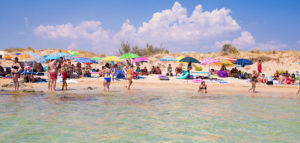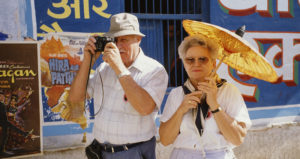Shagaluf. Ayia Napa. Marbella. Beefa.
Scouring maps of southern Europe like a Napoleonic general, the Brit Abroad plots his summer holidays. He seeks abandon, hot sun, cold beer and cheap 20-packs of Camel Blue. Territory selected, he readies his armoury: Dior Sauvage, Stone Island tee, Gucci belt. A stealth vape in the plane loos, a blast of Balearic heat when the doors slide back. The mission begins, the battlefield beckons: sunburnt bodies totter down tourist strips; big blobs of pork sizzle in the sun of a concrete Spanish resort; stumbling brigades of bloodshot-eyed boys spill plastic pints.
Such is the mythos of our favourite summer bogeyman. The past 20 years has seen the figure of the largely working-class, largely male, largely large holidaymaker conquer the middle-class imagination — a yardstick against which to define oneself.
Contrast this with the other spiritual half of British summertime, the yin to Mallorca’s yang: Wimbledon. Here, we breathlessly spot “who’s who” in the Royal Box; ladies in frilly dresses grimace through the rain; there are strawberries and cream, Pimms and “new balls please”. Hordes of neon-lit bodies in coastal Spain make way, each June, for the great and the good of “SW19” — and by the end of summer, all presuppositions about the great British class system are tidily confirmed, tucked away for the following year.
How does the Wimbledon “set” do a holiday? For many, it will involve a restless and self-conscious consumption of culture: betterment is one of the things that sets us apart from the drunken hedonists over there. In practice, this means peering around fusty-smelling churches, picking through broken tat at worthy-of-their-name flea markets and getting annoyed when waiters disregard your International Baccalaureate Italian, handing you English menus instead. Capisci, I speak from experience.
Being a “good tourist”, with hefty disdain for your vacational inferiors, means jumping through a million performative hoops to constantly prove your politeness, patience and sophistication. A memorable holiday with four of my friends descended into farce as we tried to do just that through the most Sicilian of trials, including freewheeling a clapped-out hire car down a mountain and getting stuck in a lift, only to have a furious Palermitan engineer yell at us down the phone for interrupting his lunch break. (“I come back… a domani.”) The funniest thing about middle-class tourists is the die-hard instinct to insist that everything local — broken, infuriating and a bit rubbish — is simply part of the rhythm of life here. Hyacinth Bucket tutting is reserved solely for when things go wrong at the airport (“this is why I don’t fly easyJet!”).
Yes, British tourists do sometimes behave badly — and cities have taken action accordingly. Stag-do hotspots such as Amsterdam and Dubrovnik have introduced hefty fines for public drunkenness, limitations on party boats and pub crawls, and crackdowns on lewdness and nudity. In May, party towns in the Balearics banned the sale of alcohol in shops from 9.30pm to 8am.
Meanwhile, in Barcelona, a full-on tourists vs locals war has ensued, with 3,000 protesters using hazard tape to cordon off dining holidaymakers, spraying them with water pistols. The row is based on tourist rentals driving up housing costs — which seems to me like beef with multinational bedsit-peddler AirBnB, not Gary and Sue on their summer holidays. There is similar discontent among locals in our own beauty spots, from Whitby to Weymouth, facing exactly the same problem because of Londoners’ second homes. But only one has become a cultural obsession: the one steeped in delicious snobbery about how other people holiday.
Sneering at other people’s leisure time has become an aspirational sport. This may be because, on holiday, we are encouraged to relax into our true forms, to act on our desires. Every stage of planning a trip involves a thousand moments of self-fashioning: party city or shambling slice of life? Carbon-belching Ryanair or socially conscious train travel? Resort food or chancing the local cuisine? The fork in the road seems often to fall on hedonism versus sophistication. But for some commentators, certain tourist behaviour amounts to political aggression: one, from the i, unironically ascribed the national shame of our holidaymakers to Brexit, arguing that “we don’t want to contribute to the EU, we just want to trash it, thanks”. We love to look down on our compatriots for loutishness — as though a foreign setting gives us licence to vocalise our most toxic prejudices. This is not to say that I would throw myself headlong into an all-inclusive, living off Fanta lemon and cardboard chips for a week in a Shein bikini. But haughty narratives of social degeneration are not the answer.
Once, the working classes (yes, that’s who the disdain is aimed at) could not spend their summer holidays abroad. Your big yearly trip might have involved a caravan in drizzly Wales, or knobbly-knees contests at Butlins. But firms such as Thomas Cook changed the game, offering affordable package holidays. In 1961, 1.75 million Brits went abroad; three years later, four million of us flew off. The proportion of British tourists in some Spanish resorts reached a third by the end of the decade. At a time when olive oil was something you bought from a pharmacist, European travel suddenly became available to the masses.
Before then it was the preserve of the upper classes who, springing from the pages of an E.M. Forster novel, sauntered about on the Grand Tour, sighing at suitors, clicking at waiters and mixing with none but their own aristocratic circles. The most daring antics would still be contained to the same swaggering elites, typified by the original lad on holiday — Lord Byron — who romped about in Albanian dress, shagging his way through Venice, swimming the Hellespont and barging into the issue of Greek independence.
Would some prefer the old way? To send our brightest young things to frown at Roman ruins while the poor relations “embarrass themselves” behind the closed gates of a regional Centre Parcs? It seems that though travel can broaden the mind, it can also narrow it — feeding off the stratified snottiness of rainy England. If there is a Brexit comparison to make, it is of that same self-defeating snobbery — us, respectful, cultured, cosmopolitan; them, brutish, provincial, rude. Surely, surely it’s time to pack that all in.
Sunday was the epitome of this divide. At half nine in the morning, England fans piled into pubs, swarming around Clapton’s Crooked Billet like wasps around a rotting plum. In the early afternoon, the Princess of Wales walked on to Wimbledon’s Centre Court in a magenta dress to heartfelt applause. There were polite ripples of laughter when Annabel Croft called the victorious Spaniard Carlos Alcaraz “hot”. Both finalists gave sportsmanlike speeches. A few hours later, our Euros finalists lost 2-1 to Spain; at one point before the equaliser, the camera trained on two men in crusader costumes — a common sight at any England match. There they were, leaning anxiously over the railing, decked out in the splendour of Christian knights, a shell of national fantasy. This may be the image that best crystallises the irony of the Brit Abroad: a bygone valour, a hubris, that clashes with the damp reality of our global standing.
The atmosphere around Sunday’s football had the brash sincerity of a lads’ holiday, Wimbledon the genteel and self-conscious restraint of middle-class trips to continental cathedrals. One is heavily male-coded, booze-centred, charged with a mythic optimism, the other a measured, picnic-y affair. That only one could be said to be “quintessentially English” — the latter — tells us all we need to know about who we hope to project ourselves as internationally. The sensibilities of the Grand Tour are more difficult to scrub than we think: the cringing irony around big football tournaments is, I suspect, grounded partly in disdain for the envoys sent to represent us.
On holiday, everything is political. It’s time we stopped pretending that going abroad is an act of escapism or authentic self-discovery: travel is as shot through with the anxieties of class as anything taking place on the British high street. Wimbledon and Benidorm are simply part of the circus of these social signifiers. None of us is immune: these trips are an opportunity to rehearse who we want to be, and the way we behave in our leisure time has come to represent our essential moral status. Yes, tourists shouldn’t behave like tyrants; but we should be a little more clear-headed about a fascination with a certain type of traveller. For this reason, I’m calling time on the spectre of the Brit Abroad — the most threadbare of national myths.
Disclaimer
Some of the posts we share are controversial and we do not necessarily agree with them in the whole extend. Sometimes we agree with the content or part of it but we do not agree with the narration or language. Nevertheless we find them somehow interesting, valuable and/or informative or we share them, because we strongly believe in freedom of speech, free press and journalism. We strongly encourage you to have a critical approach to all the content, do your own research and analysis to build your own opinion.
We would be glad to have your feedback.
Source: UnHerd Read the original article here: https://unherd.com/



